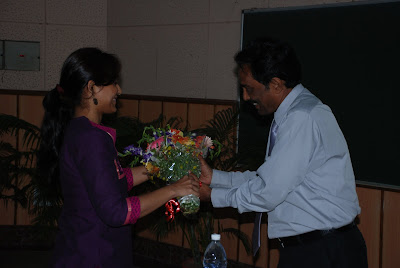

Business opportunities in the Environmental Markets – This was the theme of talk delivered at XLRI by Dr. Ram Babu, CEO - General Carbon. He has over 35 years of professional experience in the Environmental sector and has worked with institutions like National Environmental Engineering Research Institute, PricewaterhouseCoopers and CantorCO2e.
Dr. Ram’s work in the private sector includes environment impact assessments, environment & energy audits, quality & environment management systems and corporate governance benchmarking. From 1999, Dr. Ram focused on developing Clean Development Mechanism (CDM) projects. Ram has participated in setting up many of the systems and processes of the Clean Development Mechanism, which includes development of methodologies, registration of over 50 projects and issuance of over 25 million CERs. Dr.Ram has led some of the early transactions in the compliance and voluntary markets and has been instrumental in developing a variety of carbon finance structures.
Dr. Ram Babu’s visit to XLRI, one of the country’s top notch Business Schools, is part of XLRI’s initiative to impart effectual corporate leadership amongst its students through frequent and periodic interactions with industry experts as part of the CEO Forum. The event was attended by students of General Management Programme(GMP), Business Management and Personnel Management students and faculty.
With consensus finally taking shape around Copenhagen, green technologies and environmental markets offer immense business opportunities in the near future. Dr. Ram Babu in his opening remarks highlighted that in a path breaking paper by the leading economists of the world, the value of services provided by the biosphere have been valued at 1.8 times of Global GNP. With increased focus on climate change and higher commitments of nations under Copenhagen, he opined that the share of Climate balance management Systems/Service in the global GDP would reach a level of 5% by 2020 surpassing the share of IT sector.
He briefly outlined the opportunities in the environmental markets viz., Incentive and market based mechanisms, Open trading under regulations, Self Organized Private deals and Certification and eco labeling of products and services. The market in carbon credits alone is estimated at around 50 billion dollars. Impressed by the keen interest shown by the students of XLRI in becoming partners in tapping this huge opportunity, he offered help in incubating ideas in this domain. Some of the ideas which found favor were investments in improving efficiency in various domains like energy utilities, cold storages, automobile and manufacturing sector etc to generate carbon credits.
The event was very interactive and Dr. Ram Babu answered many questions of students. The questions ranged from the mechanisms under CDM, project financing for carbon credit projects, types of technologies and industries which offer opportunities under carbon credits, etc.
